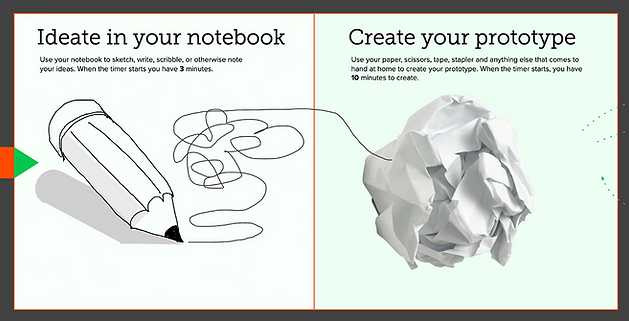Overview
Client
Fortune 500 Pharmaceutical Company (via Smashing Ideas/Luxoft USA)
Location
Seattle, Washington USA
Role
Senior UX & Instructional Designer
Tools
Mural, Adobe CC, MS Suite, Quicktime
Timeframe
1 year
Story
Problem
A Fortune 500 pharmaceutical company aimed to sharpen its competitive edge by introducing a global workforce to new ways of working and innovating.
Challenge
The challenge was to inspire employees to break from familiar routines, embrace fresh approaches, and actively share their learnings — all while accommodating diverse personalities and learning styles.
Approach
As the sole UX Designer on a team of Service Designers, I incorporated research-driven insights to create engaging, user-friendly methods for introducing Design Thinking. By applying Design Thinking to the process itself, I quickly identified user needs, defined key challenges, tested and iterated on solutions.
Outcome
The result was a tailored, multi-modal approach to Design Thinking that resonated across learning styles. This initiative directly engaged 300+ employees, sparking curiosity, enthusiasm for sharing what they learned, and a promising shift toward a more agile and innovative workforce.

Design process
User Research
I helped conduct interviews with diverse employee groups to uncover their daily challenges and needs. By involving people early, we not only gained valuable insights but also fostered buy-in by incorporating their ideas.
Ideation
Recognizing that people learn best through engagement, I proposed gamifying the Design Thinking training. This approach, rooted in research on experiential learning, resonated with leadership and set the foundation for testing.
Prototypes & testing
Using Agile methodologies, I rapidly prototyped and iterated on the workshop and supporting materials. Continuous testing allowed me to refine the experience, ensuring maximum impact and usability.
Design highlights
User research revealed a strong preference for safe, established approaches over exploration and iteration, often at the cost of innovation.
Research

Digital white detail board with affinitized research findings and insights
In the scientific setting of a pharmaceutical company and the isolation of the pandemic, choosing to make a workshop "fun" was a calculated risk that ultimately paid off.
Modeling innovation

Miro board workshop detail showing engaging instructions
Development & iteration
After validating the gamification concept, I designed a structured series of interactive games in Mural, tailored to guide participants through each phase of Design Thinking.
Workshop design

Early whiteboard outlining possible approaches
To accommodate diverse learning preferences, I developed a comprehensive set of instructional materials including a facilitated, 3-hour workshop, a series of short,friendly videos with accompanying Word docs, animated Simpleshows and a self-serve, gamified learning board.
Learning styles
I led nearly 50 hands-on, 3-hour workshops with small groups of 5-12 participants, continuously refining the experience based on real-time feedback.
Test & learn

Section of gamified workshop to teach Design Thinking
Interactive prompts
encouraged engagement and innovation while conveying concepts that could be applied to real-world situations.
Facilitation
Outcomes
User feedback
💬
💬
“I am already thinking about how I will use this process in a meeting I have scheduled for tomorrow.”
"The training clearly explained each concept, with thoughtful pauses to ensure everyone was on the same page, even across language barriers. Reflection periods helped us apply what we learned. I walked away with valuable tools for team collaboration."
Success
✅
✅
✅
Users rated themselves 9 out of 10: Extremely Likely to recommend Design Thinking to a colleague
Team leaders expressed enthusiasm for the skills gained and a commitment to sharing them with their teams moving forward.
Collaboration with Service Designers uncovered key data insights and expanded the adoption of Design Thinking across diverse teams and initiatives.
Challenges
🔴
🔴
🔴
Overcoming skepticism and fear of adopting new ways of working.
Designing for diverse learning preferences to ensure inclusivity.
Delivering dense training material in an engaging and impactful way.
Opportunities
🔹
🔹
🔹
Scale the training to reach more employees across the organization.
Expand accessibility by offering multilingual and culturally adaptive facilitation.
Follow up to assess adoption, impact, and quality of outcomes.
Key learnings
⭐
⭐
⭐
When hired as an expert, confidently advocate for proven methodologies.
In innovation-driven environments, take bold risks — and demonstrate de-risking through testing.
Challenge assumptions and design inclusively to maximize engagement and impact.









